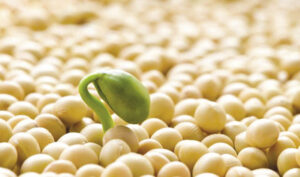
The U.S. Development Finance Corporation (DFC) has approved a loan of up to $40 million for Astarta, Ukraine’s largest sugar producer, at the sub-council level.
“(The loan) will assist in the construction and operation of a soy protein processing plant with a projected annual capacity of about 100,000 tons and help Astarta make other investments,” DFC said on its website.
At the same time, the International Finance Corporation (IFC) of the World Bank Group announced at the end of November 2024 that it was considering a $40 million loan to Astarta and a parallel $40 million loan for the construction of a soy protein concentrate plant in Poltava region. The recipient of the funds is Astarta Agro Protein LLC, a subsidiary of Astarta Holding plc.
It was noted that IFC has already assisted the agricultural holding in conducting market research, preparing a business plan for the project, and assessing its commercial viability in order to interact with potential investors.
Initially, the IFC Board of Directors planned to consider this project on December 20, but then postponed it to February 28, 2025.
As reported, in 2024, Astarta began investing in the construction of a plant for processing soybean meal into soy protein concentrate with a capacity of 500 tons per day (about 100 thousand tons per year) in the Globinsky Industrial Complex (Poltava region). The agricultural holding will invest over EUR 76 million in equipment and technology and create 110 new jobs.
“Astarta and its structural unit Astarta Agro Protein signed the first investment agreement with the Ukrainian government to receive compensation from the state for significant investments. As part of the agreement, the government will provide the agricultural holding with a number of incentives, including exemptions from import duties on new equipment, import VAT on new equipment and income tax for up to 5 years.
IFC recalled that Astarta commissioned a soybean processing plant in Globyno in December 2013. In 2023, it processed 232 thousand tons of soybeans, 73% of which were grown by the agricultural holding, and produced 172 thousand tons of soybean meal. In the first half of 2024, the share of the plant’s own raw materials increased to 90%.
Soybean concentrate is produced by processing soybean meal with higher added value. It serves as a raw material for the production of animal feed.
In 2023, the agricultural holding reduced its net profit by 5.0% to EUR61.9 million, and its EBITDA decreased by 6.1% to EUR145.77 million, while revenue increased by 21.3% to EUR618.93 million.
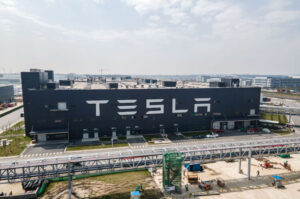
American electric vehicle manufacturer Tesla plans to complete the construction of a plant in Shanghai to produce Megapack energy storage devices by the end of this year, Xinhua news agency reported, citing a statement from the company’s local office.
Construction of the plant began in late May. The plant covers an area of about 200 thousand square meters, and the total investment in this project is estimated at about 1.45 billion yuan ($202 million).
The facility will be Tesla’s first energy storage project outside the United States and the company’s second plant in Shanghai after the electric vehicle gigafactory, with total investments exceeding 50 billion yuan.
Mass production of Megapack at the new facility is expected to begin in the first quarter of 2025. At the initial stage, the production volume will be 10 thousand drives per year, which is equivalent to approximately 40 GWh of electricity.
Megapack is a 3.9 MWh battery for energy storage and power supply support, its use contributes to the stability of power grids and prevents interruptions in their operation, according to Tesla’s website. The American company already has a Megapack production plant in California with a capacity of 10 thousand units per year.
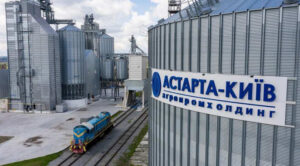
The International Finance Corporation (IFC) of the World Bank Group is considering a $40 million loan and a $40 million parallel loan to Ukraine’s largest sugar producer, Astarta, for the construction of a soy protein concentrate plant in Poltava region.
“The proposed investment is an IFC A loan of up to $40 million and a parallel loan of up to $40 million to Astarta Agro Protein Ukraine LLC, a subsidiary of Astarta Holding PLC, to finance the capital expenditures for a prospective soy protein concentrate (SPC) plant in Central Ukraine,” IFC said on its website.
It is noted that IFC has already assisted the agricultural holding in conducting market research, preparing a business plan for the project, and assessing its commercial viability in order to interact with potential investors.
It is specified that the IFC Board of Directors plans to consider this project on December 20 this year.
As reported, in 2024, Astarta began investing in the construction of a plant for processing soybean meal into soy protein concentrate with a capacity of 500 tons per day (about 100 thousand tons per year) in the Globinsky Industrial Complex (Poltava region). The agricultural holding will invest over EUR76 million in equipment and technology and create 110 new jobs.
“Astarta and its structural unit Astarta Agro Protein signed the first investment agreement with the Ukrainian government to receive compensation from the state for significant investments. As part of the agreement, the government will provide the agricultural holding with a number of incentives, including exemptions from import duties on new equipment, import VAT on new equipment and income tax for up to 5 years.
IFC recalled that Astarta commissioned a soybean processing plant in Globyno in December 2013. In 2023, it processed 232 thousand tons of soybeans, 73% of which were grown by the agricultural holding, and produced 172 thousand tons of soybean meal. In the first half of 2024, the share of the plant’s own raw materials increased to 90%.
Soy concentrate is produced by processing soybean meal with higher added value. It is used as a raw material for animal feed production.
If approved, this will be IFC’s fifth investment in Astarta since 2012.
“Astarta is a vertically integrated agro-industrial holding company operating in eight regions of Ukraine. It includes six sugar factories, agricultural enterprises with a land bank of 220 thousand hectares and dairy farms with 22 thousand cattle, an oil extraction plant in Globyno (Poltava region), seven elevators and a biogas complex.
In 2023, the agricultural holding reduced its net profit by 5.0% to EUR 61.9 million, and its EBITDA decreased by 6.1% to EUR 145.77 million, while revenue increased by 21.3% to EUR 618.93 million.
“In January-September 2024, Astarta increased its net profit by 35.1% to EUR75.60 million, EBITDA by 12.8% to $131.56 million, with revenue up 12.6% to EUR441.46 million.
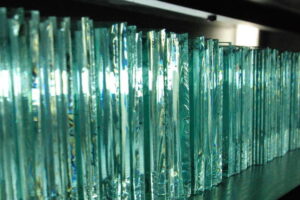
Construction of a glass plant in Kyiv region is scheduled to begin in spring 2025, said Igor Liski, owner of the EFI Group investment holding.
“This is a very complex project, we have been working on it for two years. I really hope that by the end of the year we will be able to announce the start of construction. We have already completed the entire production line. I hope that we will break ground in the spring,” Liski said at the 10th Kyiv International Economic Forum in Kyiv on Thursday.
According to him, the total investment in one production line is about EUR230 million, while about EUR100 million is export credit financing from European partners who finance their equipment.
Liski emphasized that this glass plant is a symbol of Ukraine’s recovery, so there are no plans to export it. The businessman predicts that the production of its own glass will help save the state up to EUR200 million in foreign currency earnings per year.
“We should first cover our own (needs – IF-U). Now we import on one line, after the war is over, we will need at least two lines, so we are designing a plant for two lines at once, which is another EUR200 million. Glass is a very promising product: not only technological, energy-efficient windows, but also solar panels, the automotive industry, and armored glass. Let’s eat this elephant in parts. In total, the project will cost more than a billion in 10 years, and this is only for Ukraine,” he said.
As reported, Liski plans to invest $80 million in the glass plant project.
Liski is the owner of the EFI Group investment holding (“Effective Investments”). The company’s areas of investment include healthcare and medtech, paper, food and woodworking industries, and agricultural supplies.
The company’s businesses include Feednova, an animal fats and feed additives producer, Medical Star healthcare network, Zhytomyr Cardboard Mill, Sam Ecopack, a cardboard packaging manufacturer, Forest Technology, an agricultural products supplier, Efi Agro, and Doc.ua, an online medical hub.
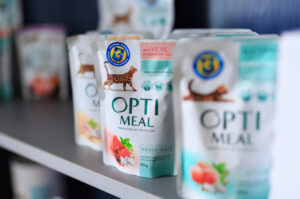
The European Bank for Reconstruction and Development (EBRD) is providing Kormotech, a leading Ukrainian pet food producer, with a financing package to increase exports and geographic diversification by building a second pet food plant in Lithuania, the EBRD press service reports.
According to the release, the total cost of the Kormotech project will be EUR63 million.
The allocated financing package is a EUR40 million A/B syndicated loan, of which EUR20 million will be provided by the Dutch SDG-focused asset management fund ILX Fund.
The bank has previously provided EUR 15 million to Kormotech Group, a long-standing EBRD client, for the construction of its first plant in Lithuania, which began operations in June 2020. The bank also provided a EUR3.3 million loan to the company to replenish working capital during the Covid-19 pandemic in 2020.
The EBRD loan is accompanied by grant financing, including a grant from the Japan-EBRD Cooperation Fund, which partially covers the costs of external lawyers. The grant funding will also partially cover the cost of new workplace equipment that will create new livelihoods for groups that need more attention, including women and people with disabilities. This component is being implemented as part of the EBRD’s new program aimed at stimulating capital investment.
The loan is provided to the Group’s holding company Vengast Investments Ltd (Cyprus) and its subsidiary in Lithuania, Kormotech UAB.
The EBRD is the largest international financial investor in Ukraine. Since the beginning of the war in 2022, the bank has provided EUR 5 billion to the Ukrainian economy and agreed with shareholders to increase capital by EUR 4 billion, which will allow it to continue lending at current levels during the war and further increase volumes during the full-scale recovery phase.
Kormotech is a global family-owned company with Ukrainian roots that has been producing cat and dog food under the Optimeal, Club 4 Paws, Woof! and Meow! brands since 2003. The company has production facilities in Ukraine and the EU, with a product range of over 650 items. Its focus on exports and geographic diversification helps it withstand the impact of Russia’s war against Ukraine.
The new project will also help Kormotech strengthen its human resources and skills development efforts in light of the current challenging situation on the Ukrainian labor market, including creating new employment and training opportunities for women, veterans, and other groups that require more attention. It will also enable Kormotech to improve energy efficiency.
In 2023, Kormotech’s turnover increased by 22.5% to $152 million from $124 million in 2022. The ratio of sales abroad and in Ukraine in tons is now 31% to 69%, respectively (in 2022 it was 28% to 72% in Ukraine).
Kormotech brands grew most dynamically in the markets of Romania (+35%), Poland (+11%) and Moldova (+11%).
Kormotech is a leader in Ukraine, one of the world’s top 50 pet food producers and one of the top 21 most dynamic pet food brands. The ultimate beneficiaries of Kormotech are Olena and Rostyslav Vovk.
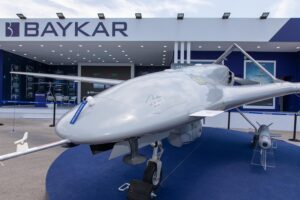
Turkish defense company Baykar intends to complete the construction of a plant near Kyiv in August 2025, the company’s CEO Haluk Bayraktar told Reuters.
“We have completed 80% of the construction and are now ordering vehicles. The date of production will be determined by the course of the war, but the facility will be ready in August 2025,” Bayraktar told the agency in an interview on Thursday.
The plant is expected to produce the TB2 or its heavier TB3 variant.
Baykar currently uses Ukrainian-made engines for its Akinci and Kizilelma drones. The company also recently signed an agreement with Ukraine’s Ivchenko-Progress to jointly develop a turbofan engine, Baykar said.
Over the next five years, Baykar will invest $300 million to develop a turboprop engine for the Akinci drone. This will be followed by the development of a turbofan engine for Kizilelma, an unmanned air-to-air combat vehicle currently undergoing flight testing.
Baykar will keep the capacity of the TB2 and Akinci production lines at the same level, and over the next few years will invest in the expansion of the TB3 and Kizilelma lines. The Kizilelma is expected to start mass production next year in the amount of 10 units. Baykar’s revenue last year was $2 billion, up from $1.4 billion the previous year, with 90% coming from foreign markets.
The company accounts for about a third of all Turkish exports of defense and aerospace products.
As previously reported, Turkish-made Bayraktar drones have gained wide popularity in the world after the Ukrainian military began using them to counter Russian troops, destroying armored vehicles and artillery systems. In February, it was reported that the Baykar plant in Ukraine would employ about 500 people and produce about 120 units per year.